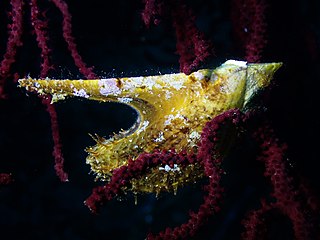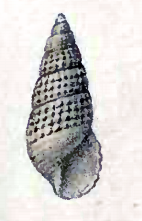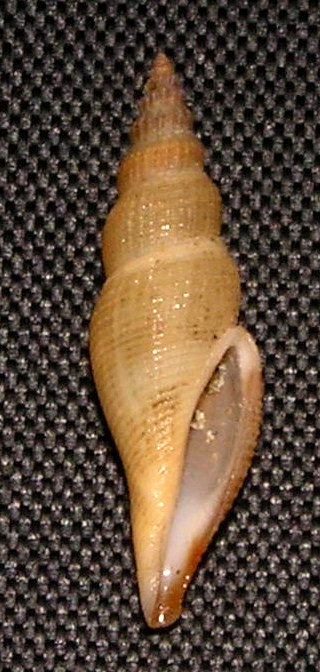
Pinctada is a genus of saltwater oysters, marine bivalve mollusks in the family Pteriidae. These pearl oysters have a strong inner shell layer composed of nacre, also known as "mother of pearl".

The chambered nautilus, also called the pearly nautilus, is the best-known species of nautilus. The shell, when cut away, reveals a lining of lustrous nacre and displays a nearly perfect equiangular spiral, although it is not a golden spiral. The shell exhibits countershading, being light on the bottom and dark on top. This is to help avoid predators, because when seen from above, it blends in with the darkness of the sea, and when seen from below, it blends in with the light coming from above.

Conchology is the study of mollusc shells. Conchology is one aspect of malacology, the study of molluscs; however, malacology is the study of molluscs as whole organisms, whereas conchology is confined to the study of their shells. It includes the study of land and freshwater mollusc shells as well as seashells and extends to the study of a gastropod's operculum.

Cultured pearls are pearls which are formed within a cultured pearl sac with human intervention in the interior of productive living molluscs in a variety of conditions depending upon the mollusc and the goals. Having the same material as natural pearls, cultured pearls can be cultivated in seawater or freshwater bodies. Over 95% of the pearls available on the market are cultured pearls.

Pteriidae, also called the feather oysters, is a family of medium-sized to large saltwater oysters. They are pearl oysters, marine bivalve mollusks in the order Pteriida.

Ostrea edulis, commonly known as the European flat oyster, is a species of oyster native to Europe. In Great Britain and Ireland, regional names include Colchester native oyster, mud oyster, or edible oyster. In France, Ostrea edulis are known as huîtres plates except for those that come from the Belon River estuary in Brittany, France, which are known as Belons.

Inoceramus is an extinct genus of fossil marine pteriomorphian bivalves that superficially resembled the related winged pearly oysters of the extant genus Pteria. They lived from the Early Jurassic to latest Cretaceous.

Odostomia is the most speciose genus of minute sea snails, pyramidellid gastropod mollusks. This genus is placed in the family Pyramidellidae in the subfamily Odostomiinae. There are several hundred species in this diverse genus

William Harper Pease (1824–1871) was a 19th-century American conchologist, shell collector and malacologist. He described many species of Indo-Pacific marine mollusks from the Cuming collection.

Pteria is a genus of molluscs in the family Pteriidae. The species of the genus are sometimes referred to as wing-oysters or winged oysters.

Pteria colymbus, the Atlantic winged oyster, is a species of bivalve mollusc in the family Pteriidae. It can be found along the Atlantic coast of North America, ranging from North Carolina to Bermuda and Brazil.

Boonea impressa, common name the impressed odostome, is a species of sea snail, a marine gastropod mollusk in the family Pyramidellidae, the pyrams and their allies. The species is one of twelve known species within the Boonea genus of gastropods.

Pteria sterna, or commonly known as the rainbow-lipped pearl oyster or the Pacific wing-oyster, is a species of marine bivalve mollusk in the family Pteriidae, the pearl oysters. This oyster can be found in shallow water along the tropical and subtropical Pacific coast of America, its range including Baja California, Mexico and northern Peru.

Pinctada mazatlanica is a species of tropical marine bivalve mollusc in the family Pteriidae, the pearl oysters. It is known by the English common names pearl oyster, Mazatlan pearl oyster, and Panama pearl oyster. Spanish common names include madre perla, and ostra perlifera panameña. This mollusc was first described to science in 1856 by conchologist Sylvannus Charles Thorp Hanley. Pinctada mazatlanica produces gem-quality pearls and was the basis of a pearling industry in the Gulf of California for centuries.

Pteria penguin, commonly known as the penguin's wing oyster, is a species of marine bivalve mollusk in the family Pteriidae, the pearl oysters. It is native to the western and central Indo-Pacific region and is used for the production of cultured pearls. The generic name comes from Greek πτερον (pteron) meaning wing.

Pinctada margaritifera, commonly known as the black-lip pearl oyster, is a species of pearl oyster, a saltwater mollusk, a marine bivalve mollusk in the family Pteriidae. This species is common in the Indo-Pacific within tropical coral reefs.
Pinctada longisquamosa, sometimes called scaly pearl oysters, are a small species of pearl oyster found in the western Atlantic. They are distinguished by unique prismatic shell structures which protrude from the outer shell.

Cytharopsis is a genus of sea snails, marine gastropod mollusks in the family Mangeliidae.

Cremnoceramus is an extinct genus of fossil marine pteriomorphian bivalves that superficially resembled the related winged pearly oysters of the extant genus Pteria. They lived from the Turonian to the Maastrichtian of the Late Cretaceous.
Cladoceramus is an extinct genus of fossil marine pteriomorphian bivalves that superficially resembled the related winged pearly oysters of the extant genus Pteria. They lived in the Santonian stage of the Late Cretaceous.



















